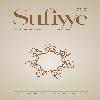An Overvıew On Tawhıd Experıence of Fırst Perıod Sufıs
An Overvıew On Tawhıd Experıence of Fırst Perıod Sufıs
___
- Ateş, Süleyman. Cüneyd-i Bağdadî, Hayatı Eserleri ve Mektupları. İstanbul: Yeni Ufuklar Neşriyat, ts.
- Bakış, Rıza. Âşığın Tevhîdi Hallâc’a Göre Varlık ve Dinî tecrübe. İstanbul: İnsan Yayınları, 2013.
- Bardakçı, Mehmet Necmeddin. İslâm Tasavvuf Düşüncesinin Teşekkülü. İstanbul: Rağbet Yayınları, 2020.
- Barret, William. “Heidegger: Toplu Bakış”. Heidegger. Çev. Ahmet Aydoğan. İstanbul: Say Yayınları, 2008.
- Buhârî, Ebû Abdillâh Muhammed b. İsmail. Sahih. İstanbul: Çağrı Yayınları, 1992.
- Cevherî, İsmail b. Hammâd. es-Sıhâh. Thk. Ahmed Abdülğafûr Attâr. Kahire: y.y.,1982.
- Chittick, William. Tasavvuf. Çev. Turan Koç. İstanbul: İz Yayıncılık, 2011.
- Cürcânî, Seyyid Şerif. Kitâbu’t-Ta’rîfât. Thk. Abdülmuim el-Hıfnâ. Kahire: Dâru’r-Reşâd, 1991.
- Çetinkaya, Bayram Ali. “İhvân-ı Safâ Düşüncesinde Temel Tasavvufî Kavramlar ve Meseleler”.
- Cumhuriyet Üniversitesi İlahiyat Fakültesi Dergisi 9/2 (2005), 205-261.
- Demirci, Mehmet. “Tevhîd’den Vahdet-i Vücûda”. Kubbealtı Akademi Mecmuası 1 (1982), 23-32.
- Ertürk, Ramazan. Sûfî Tecrübenin Epistemolojisi. Ankara: Fecr Yayınevi, 2004.
- Ferâhidî, Halil b. Ahmed. Kitâbu’l-Ayn. Thk. Mehdi el-Mahzûmî-İbrahim es-Sâmerrâî. Tahran: y.y., 1432h; Beyrut: Dâru’l-Kütübi’l-Ilmiyye, 1988.
- Gazzâlî, Ebû Hâmid Muhammed. İhyâu Ulûmiddîn. Beyrut: Dâru ibn Hazm, 2005.
- Goldsmith, Joel S. Birliğin İdraki. çev. Seval Yılmaz. İstanbul: İnsan Yayınları, 1998.
- Gueneon, Rene. Manevî İlimlere Giriş. Çev. Lütfi Fevzi Topçuoğlu. İstanbul: İnsan Yayınları, 1997.
- Hakîm, Suad. Tâcü’l-Ârifîn el-Cüneyd el-Bağdadî. Kahire: Dâru’ş-Şurûk, 3. Baskı, 2007.
- Hallâc-ı Mansûr. Ahbâru’l-Hallâc. Nşr. Luis Massignon- Paul Kraus. Paris: y.y., 3. Baskı, 1957. Heidegger, Martin. “Hakikatin Özü Üzerine”. Çev. Nejat Aday. Tezkire 36-37 (2004), 125-148.
- Husserl, Edmund. Fenomenoloji Üzerine Beş Ders. Çev. Harun Tepe. İstanbul: Bilgesu Yayınları, 2010.
- Hücvirî, Ali b. Osman Cüllâbî. Keşfü’l-Mahcûb (Hakikat Bilgisi). Haz. Süleyman Uludağ. İstanbul: Dergâh Yayınları, 1982.
- Isfahânî, Ebû Nuaym. Hılyetü’l-Evliyâ. Beyrut: Dâru’l-Kütüb’il- Ilmiyye, 1988.
- Izutsu, Toshihiko. İslâm Mistik Düşüncesi Üzerine Makaleler. Çev. Ramazan Ertürk. İstanbul: Anka Yayınları, 2001.
- İbn Fâris. Mu’cemu Makâyısı’l-Luga. Thk. Abdüsselâm Muhammed Hârun. Beyrut: Dâru’l-Cîl, 1999.
- İbn Manzûr. Lisânu’l-Arab.Thk. Abdullah Ali el-Kebîr-Muhammed Ahmed Haseballah-Hâşim Muhammed eş-Şâzelî. Kahire: Dâru’l-Maârif, ts.
- İbnü’l-Arabî. Füsûsu’l-Hikem. ta’lik: Ebu’l-Alâ Afifi. Beyrut: Dâru’l-Kitâbi’l-Arabî, ts.
- İkbal, Muhammed. İslam’da Dini Tefekkürün Yeniden Doğuşu. Çev. Sofi Huri. İstanbul: y.y., 1964.
- Kelâbâzi, Muhammed b. İsmail. et-Ta’arruf li Mezhebi Ehli’t-Tasavvuf. talik ve tahric: Ahmed Şemsuddin. Beyrut: Daru’l-Kütübi’l-İlmiyye, 2011.
- Kuşeyrî, Abdülkerim. Kuşeyrî Risâlesi. Haz. Süleyman Uludağ. İstanbul: Dergâh Yayınları, 3. Baskı, 1991.
- Massignon, Luis. İslâm’ın Mistik Şehidi Hallâc-ı Mansûr’un Çilesi. Çev. İsmet Birkan. İstanbul: Ardıç Yayınları, 2006.
- Mâtürîdî, Ebû Mansûr. Kitâbu’t-Tevhîd. Çev. Bekir Topaloğlu. İstanbul: İsam Yayınları, 6. Baskı, 2014.
- Mekkî, Ebû Tâlib. Kûtü’l-Kulûb. Kahire: Dâru’t-Türâs, 2001.
- Kelâbâzî, Muhammed b. İbrahim. et-Taarruf li mezhebi ehli’t-tasavvuf (Doğuş Devrinde Tasavvuf Ta’arruf), haz. Süleyman Uludağ, İstanbul: Dergâh Yayınları, 2. Baskı 1992.
- Ornstein, Robert E. Yeni Bir Psikoloji. Çev. Erol Göka-Feray Işık. İstanbul: İnsan Yayınları, 2001.
- Otto, Rudolf. Mysticism East And West. New York: The Macmillan Company, 1972.
- Pascal, Blaise. Düşünceler. Çev. Metin Karabaşoğlu. İstanbul: Kaknüs Yayınları, 2. Baskı, 1998.
- Ragıp el-Isfahanî. Müfredâtu Elfâzı’l-Kur’ân. Thk. Safvân Adnan Dâvûdî. Dımaşk: Dâru’l-KalemBeyrut: Dâru’ş-Şâmiyye, 2. Baskı, 1997.
- Schimmel, Annemarie. “Tasavvufta Akıl ve Mistik Tecrübe”. çev. Muhammet Şeviker, İslâm’da
- Enetelektüel Gelenekler, ed. Farhad Daftary, İstanbul: İnsan Yayınları, 2005, 149-164.
- Serrâc, Ebû Nasr. el-Luma’. Thk. Abdülhalim Mahmûd-Tâhâ Abdülbâkî Sürûr. Kahire: y.y., 1960.
- Sülemî, Ebû Abdurrahman. Tabakâtu’s-Sûfiyye. Thk. Nureddin Şerîbe. Mısır: Mektebetü’lHancî, 1986.
- Topçu, Nurettin. İradenin Davası-Devlet ve Demokrasi. Haz. Ezel Erverdi-İsmail Kara. İstanbul: Dergâh Yayınları, 1998.
- Topçu, Nurettin. İsyan Ahlâkı. Haz. Ezel Erverdi-İsmail Kara. İstanbul: Dergâh Yayınları, 1998.
- Tüzer, Abdüllatif. Dini Tecrübe ve Mistisizm. İstanbul: Dergâh Yayınları, 2006.
- Ulupınar, Hamide. “İlk Dönem Sûfîlerinde Tevhîd Anlayışı”. Tasavvuf: İlmî ve Akademik Araştırma Dergisi 22 (2008), 235-255.
- Wilcox, Lynn. Sufizm ve Psikoloji. Çev. Orhan Düz. İstanbul: İnsan Yayınları, 2. Baskı, 2003.
- Yaran, Cafer Sadık. “Çağdaş Epistemolojik Dikotomiler ve “Sofyalojik” Bir Epistemoloji Önerisi”. İstanbul Üniversitesi İlahiyat Fakültesi Dergisi 9 (2004), 21-43.
- Yaran, Cafer Sadık. Dini tecrübe ve Meûnet. İstanbul: Rağbet Yayınları, 2009.
- ISSN: 2791-6650
- Yayın Aralığı: 2
- Başlangıç: 2016
- Yayıncı: Kalem Eğitim Kültür Akademi Derneği
Gaye Bakımından Fıkıh ve Tasavvufun Karşılaştırılması
An Overvıew On Tawhıd Experıence of Fırst Perıod Sufıs
Aslî Günah Kavramını Mevlânâ’nın Günah Tasavvuru İle Birlikte Yorumlamak
Misâl Âlemi’nin Varlığına Yönelik Bazı İtirazlar Ve Misâl Âlemi’nin İspatı
Azîz Mahmûd Hüdâyî’de Hakikî Tevhîd (Ma‘Rifet) Ve Hakikî Kulluk İfâdeleri: Cem‘ Ve Tefrika (Fark)
Epistemolojik ve Ontolojik Manası Bakımından Hallâc-ı Mansur’un Hak ve Hakikat Telakkisi
Divân Şiirinde Ahlâk-ı Zemîme Tasavvuru
Mystic Narrative And Perception Through Contemporary Novels: The Example of Hacı Bayrām-ı Velī
Geleceğin Korkusunu Geçmişin Hüznünü Taşımayan İnsan: İbnü’l-vakt
